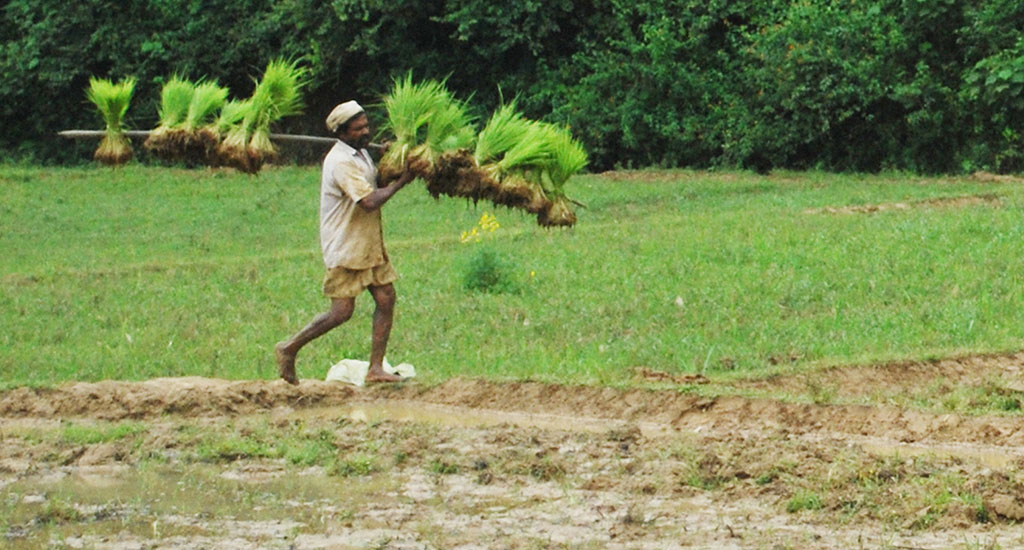Almost 10 years after receiving international recognition for saving indigenous rice varieties, Kurichiya tribal farmer Cheruvayal Raman is worried his life’s work will be lost.
Raman received the Genome Saviour Award in 2013 from the Protection of Plant Varieties and Farmers’ Rights Authority (PPVFRA), for preserving varieties of indigenous rice.
Rice researchers all over the world hail him as India’s “living paddy gene bank.” He was even invited to an international symposium in Brazil.
But nearly 10 years after getting the award, the 71-year-old tribal farmer is uncertain if his collection of indigenous seeds will be preserved.
After several health setbacks, it is unclear who will look after his seed collection in future.
Resilient rice varieties
Raman, of the Kammana village in the Wayanad district of Kerala, has been preserving and propagating 56 indigenous rice varieties for decades.

“I’m preserving them for future generations,” the organic farmer told Village Square.
Though he has studied only up to class V, he has extensive knowledge about paddy farming and indigenous rice varieties.
“Indigenous seeds are more resistant to diseases and climate change adversities than hybrid seeds,” he said. “They have a long shelf life.”
When many tribes stopped paddy cultivation and focussed on cash crops, he continued, according to Prajeesh Parameswaran, a senior scientist with Wayanad-based Community Agrobiodiversity Centre of the M S Swaminathan Research Foundation.
“This generation doesn’t know the need to conserve these rice varieties,” Parameswaran said.
Most of Wayanad’s 160 indigenous paddy varieties had disappeared when farmers switched to hybrids, or cash crops like pepper, coffee and cardamom.
“Traditional paddy cultivation in Wayanad dwindled for various reasons, and also because low-yielding varieties had no takers,” Mareen Abraham, a scientist with Kerala Agricultural University, said.
Preserving rare rice varieties
Raman has a printed list of the seeds he is preserving. Some are more than 500 years old.

The most prominent varieties of rice he preserves include Chennelu, Thondi, Veliyan, Kalladiyaran, Mannu Veliyan and Chembakam, as well as the aromatic rice varieties Gandhakashala, Jeerakasala and Kayama.
Most of his collection is from Wayanad, which was earlier “Vayal Nadu” – meaning “the land of rice fields.”
But he has not only travelled across Kerala but also Karnataka and Tamil Nadu to collect rare and endemic varieties. (ALSO READ: Bengal farmers conserve heritage rice against climate vagaries)
“Conservation is integral to Raman’s existence,” S Usha, a Thiruvananthapuram-based agriculture expert, told Village Square.
Rice farmer eats ration rice
According to Raman, who is passionate about organic farming, agriculture is not a commercial activity. As a result, he suffers yearly losses of about Rs 70,000.

“He’s not profit oriented. A rare amalgamation of idealism and farming,” said Usha.
Several farmers from Tamil Nadu, Karnataka, West Bengal and Odisha regularly take seeds from him. He gladly gives them without taking money – on the condition that they bring back an equal measure after harvesting.
“I was so focussed on preserving these seeds, I forgot that my family needed food,” said Raman. “Nobody would believe me. But often we depended on the government’s rice ration for our meals.”
My focus on native rice preservation was so intense and without thinking of money, that despite being a rice farmer, my family and I ate food cooked with government’s ration rice.”
The family’s commitment to conserve
Raman and his wife, Geetha, are custodians of 40 acres of land they had inherited.
“This farm’s been my laboratory to preserve our traditional varieties. I learned lessons from the mud and muddy waters of my rice field,” said Raman.

Despite financial setbacks, the family has been striving to preserve the rice varieties.
“We’ve set aside a few cents of land to preserve the indigenous rice varieties,” said Geetha.
Their sons Ramesan and Rajesh, and daughters Ramani and Rajitha, have divided the farm into small patches to cultivate each rice variety without losing their originality and character.
But Raman is apprehensive of the future of this gene bank.
The future of Raman’s gene bank
Raman has always dreamt of a permanent facility to preserve and propagate the rice gene bank.
“I may not live for long. As per Kurichiya customs the land will go to the children of my sisters after me. Even my wife won’t have any stake after my death,” he said.
He is apprehensive that the extended family members who live outside Wayanad and have no inclination for farming may not preserve the seeds.
All my effort over the years will be wasted,” if no one helps Raman save his seed bank
Need for institutional intervention
There are several gunny bags with rice seeds in his 150-year-old thatched-roof house. Raman is ready to hand them over to any rice research centre, agricultural university, non-governmental organisation or interested individuals.
“Universities should record and preserve his practical knowledge on traditional rice farming,” said Usha.
Dr K Ramiah Gene Bank at Tamil Nadu Agricultural University procured 30 varieties from him.
“I gave a dozen varieties to a research centre from Delhi,” said Raman. “But I don’t believe in conventional gene banks. I’m not against scientific farming. Only that would alleviate poverty. But the practical way to preserve native varieties is to grow them.”
Renowned scientists and political leaders have visited his farm. But Raman wants these to translate into government intervention and assistance from environmental institutions or NGOs to keep the gene bank for future generations.
“Raman represents the last generation of Wayanad tribes who protected their indigenous rice varieties without bothering much about the financial gains,” said O K Johnny, Wayanad-based author and local historian. “Society must preserve his work for future generations.”
KA Shaji is a Wayanad-based journalist who writes on human rights and environment.








